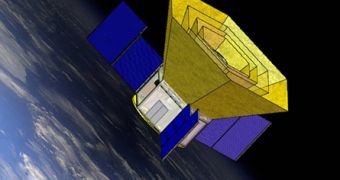The universe is expanding. Not only that, but this expansion seems to be accelerating and is now blamed by physicists on a strange form of energy called dark energy. The problem with dark energy, as it is with dark matter, is that we can't seem to find any direct evidence of its existence. What if this cosmic acceleration expansion can be explained through some other phenomenon and dark energy is just another product of our imagination? Well, let's see.
According to theorist Robert Caldwell from the Dartmouth College and Albert Stebbins from the Fermi National Accelerator Laboratory, the same accelerated expansion effect could be obtained if the Earth and its surroundings are centered in a billion-light-year-long bubble, surrounded by a dense shell of material that is pulling the galaxies towards it. This would mimic exactly the process that led us to believe that the universe is suffering an accelerated expansion in the first place.
The problem is that some five centuries ago, astronomer Nicolaus Copernicus said that the Earth was by no means a special place in the universe and that the central position in the solar system was occupied by the Sun and not by our planet as people previously believed. This is called the Copernican principle and as you can already see, the 'no dark matter' explanation proposed by the two researchers already violates this principle. The real question here is whether Copernicus was right when he said that the Earth did not occupy a privileged position in the universe.
"Although the Copernican principle may be widely accepted by fiat, it is imperative that such a foundational principle be proven", say Caldwell and Stebbins. If indeed the universe is different in other places, then the cosmic microwave background left behind by the Big Bang should reveal it.
An Earth residing inside a large cosmic bubble would receive a microwave background radiation directly and without reflection, which should bear the exact signature of a perfect blackbody object with the temperature of 2.7 Kelvin. However, if we are not in the center of the universe, as the two propose, then the microwave background signature should reveal an asymmetric distribution of matter in the universe with one side having a greater density of matter than the other.
These two points of view on the universe, proposing two different scenarios, are in fact one and the same, according to Caldwell and Stebbins. Because free electrons can reflect some of the background radiation photons, our exact position in the universe can be estimated by observing the tiny deviations from the perfect black body spectrum.
Still, the most precise measurement of the cosmic microwave background radiation was made in the 1990s with NASA's Cosmic Background Explorer, which unfortunately was not sensitive enough to observe such deviations. NASA's Absolute Spectrum Polarimeter satellite on the other hand, expected to launch in the next decade, could detect them.
Alternatively, Jean-Philippe Uzan, Chris Clarkson and George Ellis say that the Copernican principle could be easily tested by measuring the redshift change of receding galaxies as they move at an accelerated rate through space. "The expansion rate of the universe at distant objects and the distances we measure to those objects have to be related in a very precise way. At the moment the drift can't be measured at all, so very large telescopes are needed together with very sensitive spectrographs. It's an extremely small effect", Clarkson explained.
Caldwell believes that "mathematically they may be justified, but the necessary precision and accuracy may not be achievable for many years." He also hopes that the place we live in is no different than the rest of the universe. Not that the possibility of us being in the center of the universe wouldn't be exciting, but dark energy sounds a little simpler for the time being.

 14 DAY TRIAL //
14 DAY TRIAL //